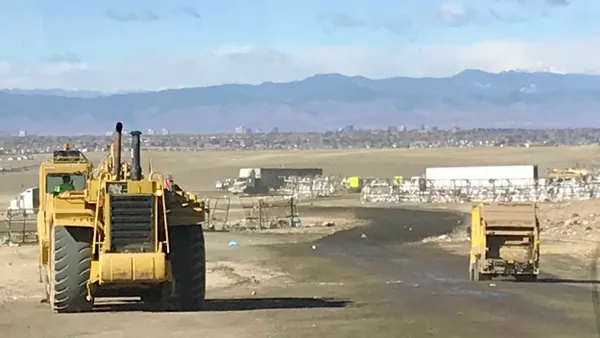Dive Brief:
- Casella Waste Systems is closer to expanding its Waste USA landfill in Coventry, Vermont after local environmental group Don’t Undermine Memphremagog's Purity (DUMP) dropped its appeal against the site's solid waste permit. This comes after a year-and-a-half of opposition to a 51-acre expansion plan, as reported by VTDigger.
- One major point of contention has been the presence of controversial per- and polyfluoroalkyl substances, or PFAS, in the landfill's leachate. In addition to requiring Casella to hire an independent engineer to assess odor control, it also bars the company from treating leachate at facilities within the lake's watershed until 2024. Any plans after that must account for PFAS contamination.
- Casella already received an Act 250 permit in January that bars the company from sending its leachate to the treatment plant in Newport near the lake and requires a third-party odor monitor. In an email to Waste Dive, Casella Vice President Joe Fusco said the company is "happy to be moving forward" on expansion efforts, but did not clarify where the leachate will now be treated.
Dive Insight:
Coventry is the only active landfill in Vermont, a state with aggressive waste reduction mandates. At present, the landfill is permitted to take up to 600,000 tons annually, including around 70% of the state's solid waste. The site also generates power for approximately 8,500 homes in Vermont via both landfill gas-to-energy and solar power.
The landfill is expected to reach capacity within the next few years and Casella has pushed for the expansion to extend its longevity another two decades. But residents have long complained about odors and other concerns, and Casella's expansion plans have heightened that tension. Canadians on the other side of the border have also pushed back, as have a number of environmental organizations. A leading source of concern has been wastewater. State sampling found Casella's leachate contains the highest levels of PFAS in Vermont.
PFAS, or "forever chemicals" found in everything from non-stick pans to firefighting foam, have been linked to cancer and other health risks. Landfill operators are increasingly grappling with the presence of PFAS at their sites, as well as the potential for the chemicals to enter drinking water. The Coventry site's leachate had been treated at the nearby Newport treatment plant, on the Clyde River. That area flows into Lake Memphremagog, which provides drinking water for communities on both sides of the border.
Waste Management is currently grappling with PFAS in the leachate from its own landfill in New Hampshire, which has been discharged into rivers from wastewater treatment plants in Maine and Massachusetts. Tests of that leachate last year found 9,700 parts per trillion of some types of PFAS, exceeding federal health advisory levels for drinking water by more than 100 times. Neither the plants nor the landfill are required to monitor for PFAS.
While the PFAS levels found at Coventry were below the state's recommended levels, DUMP is still concerned about the possibility of contamination. That issue was among the reasons DUMP contested the permit issued in October 2018 by the Vermont Department of Environmental Conversation (DEC).
Henry Coe, a coordinator for the group, shared a press release with Waste Dive outlining the settlement: "[N]o leachate will be disposed in the watershed until, and if technology demonstrates the ability to treat PFAS landfill leachate to health standards yet to be established for Vermont State surface waters."
DUMP called the settlement "bittersweet" but Coe said the decision was a "pragmatic" one made for financial reasons. The settlement notably does not address when Casella might close the landfill. Per the company's latest earnings call, Casella plans to spend approximately $20 million on the expansion with work continuing through 2020.
Casella has previously pledged to double-line cells to minimize potential leachate contamination of soil and groundwater. To obtain wastewater treatment permitting, the company will also need to continue working with the DEC, particularly on PFAS contamination concerns. Fusco said his company "will be providing DUMP with direct and convenient access to information on permits that we submit to the Agency of Natural Resources, and the ongoing, continuous work we do to ensure a clean and safe environment in Vermont."
There are six potential facilities apart from the Newport plant that Casella is authorized to use, according to the Conservation Law Foundation. In recent years Casella has shipped leachate to several cities and towns in the wider area, namely Montpelier, Plattsburgh, and Barre, along with Newport.









